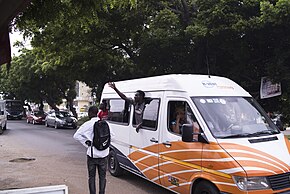


In Ghana and neighboring countries, tro tro are privately owned minibus share taxis that travel fixed routes leaving when filled to capacity. [1] While there are tro tro stations, these vehicles for hire can also be boarded anywhere along the route. [2]
Operated by a driver and a conductor (who collects money, shouts out the destination, and can also be called a "mate"), many are decorated with slogans and religious sayings. [3] Fewer tro tros operate on Sundays. [4]
The term is believed to derive from the Ga word tro, "threepence", because the conductors usually asked for "three three pence", which was the standard bus fare in the 1940s, when Ghana still uses the British West African pound and later the Ghanaian pound. [5] [6]
Alternatively, its origin is not "three times three pence" but rather "threepence [thruhpnce, tro] each": doubling a coin's name in the vernacular means "that coin for each person (or item)". Three pence was the price per passenger in the early 1960s, when pounds/shillings/pence were still in use, including threepence coins, before decimalization of the currency into cedi and pesewa in 1965. [7]
Ghana
Used by 70% of Ghanaian commuters, tro tro is the most popular form of transport for work and shopping in the country as of 2010. [8] Large buses also provide public transport in Accra, Ghana, as of 2008 [AICD 1] and are patronized by people of different social classes. [9]

Regulation
In Ghana, tro tro are licensed by the government, but the industry is self-regulated. [2] There was no independent transport authority as of 2008 in the capital, Accra. [AICD 2]
In the absence of a regulatory environment, groups called syndicates oversee minibus share taxis like tro tro in Africa. These may collect dues, set routes, manage terminals, and fix fares. [AICD 3] In Accra as of 2008, such syndicates include GPRTU and PROTOA. [AICD 4]
Despite the regulatory challenges, the service would lend itself to some regulation during the COVID-19 pandemic in Ghana. This allowed it to record significant levels (98%) of compliance to guidelines on physical distancing, although guidelines on individual use of face masks were more difficult to enforce. [10]

See also
Further reading
References
-
^
- For private ownership and fixed routes, see Report from the Field: The Tro-Tro – An Essential Mode of Transport in Accra, Ghana by Susan Blaustein. blogs.ei.columbia.edu, 9.29.2010
- For leaving when full, see Ghana: The Bradt Travel Guide (page 69) Philip Briggs. Bradt Travel Guides, 2007. 4th ed. 416 pages. 1841622052, 9781841622057 (Google Books)
- ^ a b Report from the Field: The Tro-Tro – An Essential Mode of Transport in Accra, Ghana by Susan Blaustein. blogs.ei.columbia.edu, 9.29.2010
-
^
- For tro tro mates, see Report from the Field: The Tro-Tro – An Essential Mode of Transport in Accra, Ghana by Susan Blaustein. blogs.ei.columbia.edu, 9.29.2010
- For slogans and sayings, see TroTro Station ghanaweb.com
- For religious slogans and sayings, see TroTro: Transport for the People by the People ghanaweb.com
- ^ Ghana: The Bradt Travel Guide (page 69) Philip Briggs. Bradt Travel Guides, 2007. 4th ed. 416 pages. 1841622052, 9781841622057 (Google Books)
- ^ "tro-tro - Definition of tro-tro in English by Oxford Dictionaries". Oxford Dictionaries - English. Archived from the original on August 26, 2018.
- ^ "TroTro: Transport for the People by the People". www.ghanaweb.com.
- ^ "Trotro_(Ghana)". www.in-formality.com.
- ^ City of Accra, Ghana consultative citizens' report card (page 113) Report No. 55117-GH. The World Bank. 2010/06/01.
- ^ Sarfo, J. O. (2016). ‘Bone-shakers’ and contemporary ‘Tro-Tro’ in Ghana: Implications for traffic and transport psychology. Africa: History and Culture, 1(1), 15-20. Retrieved from: http://ejournal48.com/pdf.html?n=1472719700.pdf
- ^ Dzisi, Emmanuel Komla Junior; Dei, Oscar Akunor (2020-08-03). "Adherence to social distancing and wearing of masks within public transportation during the COVID 19 pandemic". Transportation Research Interdisciplinary Perspectives. 7: 100191. doi: 10.1016/j.trip.2020.100191. ISSN 2590-1982. PMC 7396893. PMID 34173465.
- ^ Stuck in Traffic; Urban Transport in Africa (page xiii) Archived 2012-09-17 at the Wayback Machine Ajay Kumar & Fanny Barrett. Africa Infrastructure Country Diagnostic in cooperation with the World Bank, January 2008. Draft Final Report.
- ^ Barrett & Kumar, page 14
- ^ Barrett & Kumar, page xiv
- ^ Barrett & Kumar, page 9